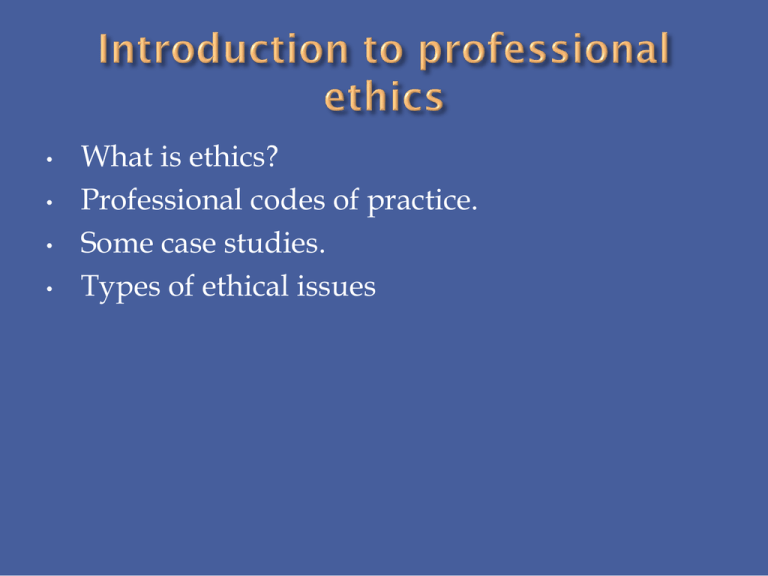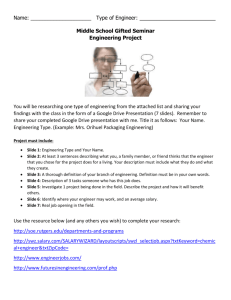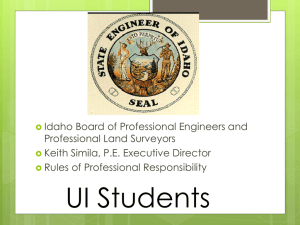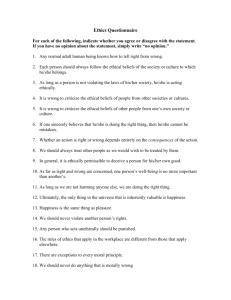slides - Personal Home Pages
advertisement

• • • • What is ethics? Professional codes of practice. Some case studies. Types of ethical issues What is ethics? “branch of philosophy dealing with values relating to human conduct, with respect to the rightness and wrongness of certain actions and to the goodness and badness of the motives and ends of such actions” List potential activities of an Electrical Engineer that could potential cause harm to Humans or the environment. Professional engineers are expected to act ethically Surely it is OK to just act legally? It's legal so we can do it. Not always clear what is legal. 1928: the common law only acknowledged a duty of care was owed to people harmed by the negligent acts of others in specific and limited circumstances. Woman (Donoghue) drinks ginger beer (Stevenson) . . . finds slug in glass . . . is ill . . . . . case of Donoghue v Stevenson . . . . Leechman argued that Stevenson’s had a "duty of care" even without a contract. Four years later, in the Lords, he established it as a principle of law when Lord Atkin ruled everyone has a duty to: "take reasonable care to avoid acts or omissions which you can reasonably foresee would be likely to injure your neighbour". http://www.scotsman.com/news/health/legal-world-celebrates-legacy-of-dead-slug-with-a-taste-forginger-1-650612 PROFFESIONAL CODES OF PRACTICE. To be a professional engineer you are bound to abide be these guidelines. Codes of practice can not cover every situation. But they do state that professional engineers should act ethically. "Being a professional engineer means that the wider public trust you to be competent and to adhere to certain ethical standards. The trust you derive from being seen as a professional is one of the advantages of being a member of the IET, but it also means you have certain ethical responsibilities." "Like most professional bodies, the IET has a number of Rules of Conduct which set out the standards of behaviour expected of its members. However, a list of rules will never cover every situation that may arise, and there will always be a role for individual judgement in deciding how to apply these rules." Doing the right thing. Depends on the situation. You need to be able to justify your actions Discuss any potential issues that arise from the following examples. Your company has decided to use the "electricity to boost maths concept" in a product (see hand-out). The proposal is a head band that can be worn by pupils/students that will provide the required electric current to enhance maths learning. The marketing guys are getting quite excited. An initial survey of students and parents indicates that there is potentially a large market. http://news.nationalgeographic.co.uk/news/2010/11/101104-electric-current-brains-math-sciencehealth/ Discuss any ethical issues An official complaint has been filed to the US Federal Trade Commission about a Facebook experiment that manipulated the emotional state of users. The complaint was filed by digital rights group the Electronic Privacy Information Center (Epic) Facebook collaborated with two US universities to see if changing the emotional content of stories and updates sent to users' Facebook profile pages had any effect on the people that read them. It found that it was possible to influence people and that those who read fewer messages with negative emotional content were less likely to write a similarly negative personal update on their profile page. http://www.bbc.co.uk/news/technology-28157889 You are working for a company which develops face recognition software. A large supermarket chain has approached you with a potentially lucrative project to install video surveillance systems in all their supermarkets. The proposed system will use security cameras to track customers to see how they react to changes in store layout, promotions etc. The face recognition software will be coupled to the checkout system which will use loyalty cards to identity customers. This will allow them to maintain a database of customer behaviour Discuss any ethical issues associated with this project. http://www.theguardian.com/technology/2013/nov/04/tescos-face-scanning-system-the-key-questions-answered You are working for a company supplying hardware/software for use on space missions. You are part of a team designing a new piece of equipment. The new design uses an (FPGA) programmable logic device. You have heard that these devices can occasionally malfunction if exposed to the levels of radiation experienced outside the Earth's protective atmosphere. You discuss this problem with your line manager but he just says that the chances of the device failing is so small it is not worth worrying about it. What should you do? "How do you take advantage of business opportunities whilst making sure you are as honest as possible with your customers? What action might you take to make a "facilitation payment" to win a contract?" “To what extent should your own moral views about war and warfare affect your professional judgement as an engineer in the defence industry?” “In what situations can a claim of "whistleblowing" justify the disclosure of confidential information?” “How do you know whether you, as an engineer, are competent to make a particular decision which might have important personal consequences for people?” Health and safety “How can we justify any risk to human life? What is a reasonable risk?” Information / privacy Honesty Integrity Confidentiality Competence Commercial pressure Environment / sustainability Health and safety Information / privacy Launched despite temperature being to low for O rings. Pressure from management on engineers to give the right “answer” Break down in safety. Procedures not followed 67 people killed http://sbj.net/ “For three years, Google’s street view cars roamed cities worldwide photographing street scenes for use in creating Google maps. While doing so, it also identified Wi-Fi hot spots.” “According to Google, its engineers accidentally inserted the wrong data-sniffing code while experimenting with the software and failed to discover the error when they put the software into street view cars” “Whether Google acted illegally or unethical remains debatable. Without evidence of wrongful intent, however, Google’s collection of Wi-Fi data remains only an embarrassing blunder.” Professionals must act ethically. Ethics is about doing the right thing. Depends on the situation. You need to think!




